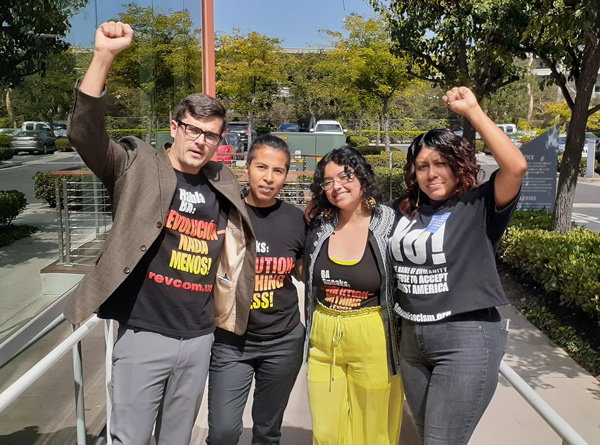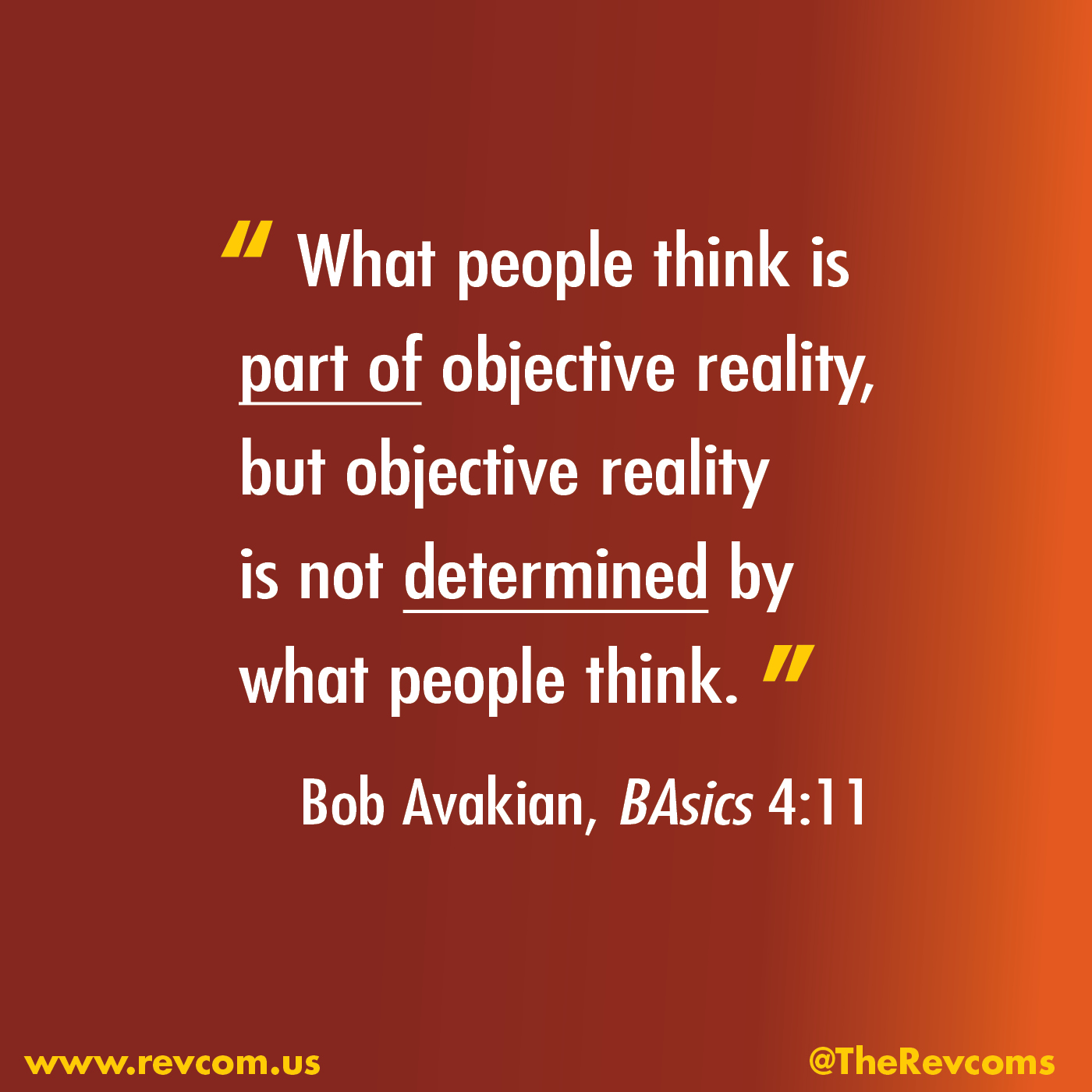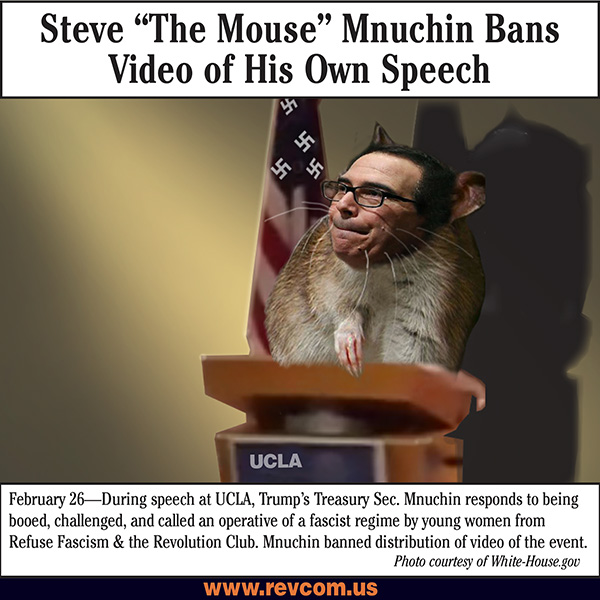#UCLA5: Jujitsu in the Courtroom
| revcom.us
Editors’ note: Four members of Refuse Fascism, Los Angeles and the Revolution Club were recently found NOT GUILTY in a case that should have never gone to trial. They were facing up to TWO YEARS in jail for speaking out when the fascist Treasury Secretary Steve Mnuchin came to speak at UCLA. (See here on more on the struggle around the #UCLA5.) This is a story of people taking a stand against oppression, coming under unjust attack, and using every avenue they had—including the procedures of the courtroom itself—to carry that struggle forward. The fact that they were charged at all shows how late the hour is getting; the way that they won indicates that there is still time to reverse the march toward fascism. Revolution/revcom.us was able to sit down with a few of the #UCLA5 defendants to hear more about their case.
Question: Can you talk about the process of testifying? What was the prosecution’s strategy for prosecuting this case, and how did you actually meet that and turn that around in your favor?
Luna: We went into the testimony knowing that what needed to come through was why we did what we did, what are the actual stakes for humanity, bringing in the context of a consolidating fascism and the nazification of campuses... the need to be protesting all that.
The prosecutor is really reactionary, she used to have a focus on prosecuting protesters and we actually have experience with her in a case she prosecuted against people who did civil disobedience against murder by police in 2015. We knew from that she was going to try to paint us as “crazy protesters,” so we were going to have to turn all that around. While mainly going on the offensive about the politics of why we did what we did and why it was right. For example, at one point, she tried to paint it like I was just really mad at UCLA, that I hated UCLA for having Mnuchin speak. I answered it, “I'm not happy that there are fascists and white supremacists in the White House.”
Michelle: From the beginning, [prosecutor] Waxler said this case wasn’t about political protest, that people shouldn’t make up their minds ahead of time. She made this ridiculous point about the case being as simple as a peanut butter and jelly sandwich. If you have all the elements, the bread, the peanut butter, the jelly... if I’m at a protest and I put all that together, did I make the sandwich even if I was at a protest?
But through the trial, her questions became more and more political. She asked everyone in the club about their nicknames, brought in our social media, she asked one of us if we were a communist. She kept hammering about intent, “Did we intend to shut down this event, to disrupt Mnuchin and have our spotlight, our moment to say what we had to say at this event.” She tried to paint us as people who don’t give a fuck about others. “People were just trying to come together to share ideas. These defendants were so angry at UCLA that they were rolling out the red carpet for what they call ‘fascists’ and they felt that this was their time, their stage.” She was so condescending that in the closing arguments she basically compared us to dogs. She said, “Although dogs don’t speak... not that I’m calling any of these defendants dogs... I can always tell what my dog intends by her actions even if she doesn’t speak.”
On this, my lawyer actually had a very good, funny response. He talked about his one-eyed cat, Wink. He used to think Wink rubbed up against his leg to show love, but he found out later it was to mark territory. But the point was how ridiculous and fucked up this was—she was trying to twist our intentions, even though we made very clear what our intentions were throughout all of our testimony—to call out this fascist regime and call people into motion against it.
The prosecutor kept thinking she had us with “gotcha points.” She brought in screen shots from Twitter of me saying that I had disrupted Mnuchin, but it was clear her argument was that we are driven by politics and our politics are out of bounds. All while she kept saying “this is not political.”
Luna: Her strategy backfired, though. This one juror said to us afterwards, “At a certain point, I felt like the prosecutor was yelling at us. And I wasn’t raised that way, to be yelled at. I didn’t even want to listen to her at that point.”
Michelle: The prosecutor brought up my previous conviction, from those anti-police brutality protests where she actually said, “You thought that by breaking the law and disobeying an officer’s command, you were standing up to murder by police.” I answered, “No, I was calling attention to the murders of Black people running away from police who are shot in the back. Civil disobedience is a way to call attention to this and give people a way to act.”
She was trying to twist our words, we were responding with the truth.
We took all this on non-defensively, with a lot of certitude about why what we did was right, why it wouldn’t have been right if Mnuchin’s speech had gone on without being challenged, what it would have meant if people didn’t speak up against all the shit that he was saying.
The judge kept telling the jurors to just go by what’s happening in the courtroom, but we kept bringing in what is going on in the world. This whole trial was very much happening in the context of fascism consolidating. That reality was coming out of what people were saying. The foreperson of the jury said through all this, it was clear that our rights were the ones being violated, so that’s why he voted not guilty. He got it that protest is a right that people still do have but that right was being fought out in court, are we going to have that right or not?
__________
Q: What was the jury selection like?
Atlas: This jury pool was a random selection of 60 people from the west side of Los Angeles. You had several UCLA students, you had tech experts, you had a doctor, you had several lawyers, a lot of people who worked in the film industry, you had all different kinds of people mainly from the middle class. In the selection process, the voir dire, they were asking questions of the jury to determine if they were going to be good jurors. But so many people were openly defiant to the prosecutor. Some people actually said, “If this case has to do with protest against Trump, I’m going to vote not guilty.”
There was even some challenging of the prosecutor straight up. One person said you can’t just look at the laws per se, but you actually have to look at the context to evaluate whether something is legal or illegal and whether or not it should be a criminal charge. Another juror gave a whole speech about why protest sometimes has to go out of bounds to achieve justice. Some jurors talked about their distrust of the police, of the government, and very palpable feelings of opposition. To be clear, this was polarized... a lot of people talked about how they trust the police straight up, or a couple even spoke out in favor of Trump. But overwhelmingly, there was a visceral opposition among many. Several people said they couldn’t be neutral or objective in a situation where Trump is in power and they wanted to help protest against him.
The defense lawyers asked really good questions in the voir dire, about where people get their news, or “if you could pick anyone living or dead to have dinner with—that you aren’t related to—who would it be?” You learn a lot about people from that answer—one person actually answered Donald Trump, but others answered Frida Kahlo, Beyonce, Michelle Obama, the musician Warren Zevon, one woman (who was clearly conservative) answered Jesus Christ.
Another question one of the lawyers asked was, “If I say the word Ferguson, what comes to mind?” A few people in a row answered: “mayhem and violence.” Or, “how sad it is when people mess up their own community.” One of the most outspoken prospective jurors answered something like “a justifiable response to the police murder of a young Black man.” Then one of our lawyers did a whole powerful thing about separating out the cause of the protest and the effects. This both drew out people’s thinking but also repolarized things to where people had to assess where they were going to stand.
__________
Q: What was the response from the jurors to your testimony, how did their understanding change about the objective situation?
Atlas: First, when the decision came down, as each charge was read “not guilty,” there were giant smiling faces from the jury, all watching us. And as each verdict came in, tears started welling up in the eyes of the defendants, of the lawyers, and the jurors. After this, the judge said, “Okay, you can talk to whoever you want now, there’s no more restrictions,” and five jurors walked straight up to us and hugged us, saying: “Thank you so much, you people are amazing, you’re my heroes, it’s really important what you did, keep on doing the work you’re doing.”
It became obvious to the jurors that this case was about our freedom of speech and the right to protest, that these charges were illegitimate. All the jurors we talked to were impacted by our testimony. That when we were speaking about the seven billion people of the world, when we were talking about the crimes that sections of people are suffering under, like immigrants being put in concentration camps.... this was moving... to see who we actually are, and why we’re doing what we’re doing. They even said that they knew that none of the defendants had to testify, and the fact that they all went up there was important.
Luna: One woman said, “You guys are very articulate, I wish I was just as articulate as you are because what you think and how you see this really came through.” She also said she was crying throughout, seeing the videos and hearing the testimony. And when she saw the way Tala was yanked out of her chair, her mouth dropped and she looked in shock. She said to me later, “People should be able to protest and be able to do what you guys are doing and this case was wrong.”
Michelle: Throughout the trial, it was interesting to watch different people’s reactions. In Waxler’s closing arguments, she tried to argue, “Oh, I was wrong, it is a free speech trial because you guys violated the rights of Steve Mnuchin.” People’s jaws literally dropped, like what the fuck... she really went there. One guy who wants to join Refuse Fascism said he came to see how it was more than just the elements of her case, but this was a prosecution against these people in particular.
One juror said he noticed the kind of relationship we had with our lawyers. They were inspired by the attorneys’ arguments and their seriousness and how much they actually fought for us. One juror said, “I started crying when I saw your guys’ attorneys start crying.” All of our attorneys were just in tears, I looked over and holy shit, everyone’s crying.
Q: Why were the attorneys in tears? And what was the relationship with the attorneys?
Michelle: It was a different trial for the attorneys on many levels. First, they really cared about this case and they fought hard. Also, there was a lot of struggle about breaking from just caring about “me and my client.” They were part of a collective and were working with the defendants and non-lawyers on our legal team. We were constantly sending memos, asking questions. This was different than just, “Do what you gotta do, and let me know when my next court date is.”
We worked together every day, talking about what happened in court, doing analysis, how are we coming back tomorrow even stronger, having meetings with them during lunch breaks, calling them after court. My attorney wasn’t like, “I’m just gonna go at it this way, no matter what you think.” He was constantly asking for what we think. We kept coming back to what our legal defense was and fighting different questions through with them. Not just on the technicality of whether or not we did a, b or c, but on the biggest level, proceeding from what’s happening in the world and what we are actually trying to do in terms of fighting this case politically. We spoke out as part of the fight to drive out this fascist regime. What we did was legal but also right. We’d been illegitimately arrested and illegitimately charged. Our legal strategy was informed by all that.
But we also had a lot of fun together: joking around, passing notes during trial... and the more we were going through the trial, the closer we all got. My lawyer teaches at a progressive law school and he wore one of the shirts we made for court when he taught his class: “The order of fascism or the struggle for justice?” He said he took a picture of himself in front of his board wearing the shirt. Their hearts and minds were really in it, and that showed.
Luna: One significant thing is that in all of their arguments, they weren’t just defending their individual clients, they were defending all of us. That was significant and they even got told by the judge to stop, but they didn’t.
One of our lawyers, a public defender, told us, “You really inspire me. I come into this court every day and I have to see all of these Black people getting mass incarcerated. You come in and you’re actually doing something about it.” This was so against the grain and against the norms of just having people go through the machine of mass incarceration. We were there saying no, it doesn’t have to be this way.
Michelle: We also found out after that we were having an impact on all these people in the building. A woman doing security in the front of the courthouse told us, “You guys have me reading articles on the website about your cases and about fascism. I spent my whole shift reading.” There were other people who worked in the courtroom—official court personnel—who were moved by us. One woman, when the verdict was being read, was holding back tears and smiling.
Luna: At one point, a woman who worked in the courtroom saw all of us walking in—the defendants and lawyers—and said, under her breath, “Here comes the dream team.”
Michelle: You could see throughout the whole thing, this case was not happening in a bubble. I think it was like people seeing what future people were like, and inspiring the fuck out of all these other people on how different, what kind of different relations people are modeling. The Points of Attention for the Revolution were being modeled and we were there fighting for that kind of future. Throughout the whole thing that had an impact on everybody.

UCLA defendants
Courtroom Audio #1#UCLA5 Defendants Take the Stand On Trial for Disrupting Fascist Steve Mnuchin During his speech at @UCLA in 2018.#TrumpPenceOutNow #OUTNOW #UCLA #NoFascistUSA#Humanity #LosAngeles #NotGUILTY@RefuseFascism @RefuseFascismLA @tuneintorevcom pic.twitter.com/KaVexSfk1E
— Revolution Club Los Angeles (@revclub_la) October 20, 2019
Courtroom Audio #2 #UCLA5 Defendants Take the Stand On Trial for Disrupting Fascist Steve Mnuchin During his Speech at @ucla in 2018.#TrumpPenceOUTNOW #OUTNOW #NOTGUILTY@RefuseFascism @RefuseFascismLA @tuneintorevcom pic.twitter.com/lR7LYzooUW
— Revolution Club Los Angeles (@revclub_la) October 20, 2019
Courtroom Audio #4#UCLA5 Defendants Take the Stand On Trial for Disrupting Fascist Steve Mnuchin During his speech at @ucla in 2018. #TrumpPenceOutNow #OUTNOW #NoFascistUSA #LosAngleles #UCLA #Humanity@RefuseFascism @RefuseFascismLA @tuneintorevcom pic.twitter.com/vdBR9qlLgb
— Revolution Club Los Angeles (@revclub_la) October 20, 2019


Get a free email subscription to revcom.us:

